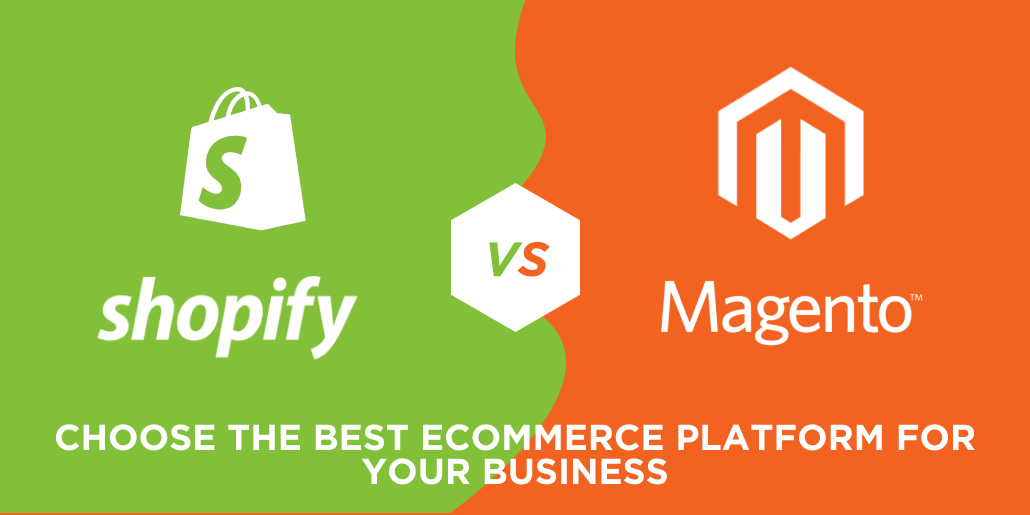Choosing the right ecommerce platform for your online business might be difficult because many options are available. Knowing what is true and what is false is very difficult because so much contradictory information is available.
In the discussion over the best eCommerce platform, two main competitors, Magento and Shopify, are frequently mentioned. The truth is that while there are some parallels between these two platforms, they are essentially entirely distinct. Here will look for the difference between Magento Vs. Shopify Comparison:
Table of Contents
What is Shopify?
An easy-to-use platform for creating an internet business is Shopify. It includes cloud hosting in the scope of its offerings. Owners can access their shop as soon as they register a Shopify account.
Depending on the subscription levels of Shopify development services chosen, each store owner receives different services and functionality. Tools for processing payments, shipping, and marketing are just a few of the essential Shopify features included with all subscription plans.
Shopify’s technological stack is locked. Shopify makes use of exclusive tools like the Liquid-template language. Shopify gives owners of online stores fewer tools than Magento to manage, monitor, and improve the speed at which their store loads. Additionally, it offers fewer customizing choices.
What Is Magento?
The open-source software platform Magento was created for e-commerce. The frameworks it uses, like Laminas, Symphony, PHP, and others, give online shippers more flexibility and control.
Shop owners receive everything they need to alter the way customers shop and the layout of their establishment in order to reach a wider audience and stand out from the competition.
Shopify
The variety of services offered by the Shopify store development platform is one of the reasons it is so well-liked.
In reality, when comparing Shopify to BigCommerce, for instance, the features offered are one of the things that set it apart from other apps of a similar nature. Among Shopify’s distinctive features are the following:
- Shopify Payments: If you utilize Shopify Payments, which is built within the platform, there are no additional transaction costs. Shopify has its own payment processor.
- Abandoned checkout recovery: Send users a link to their abandoned cards in an email regularly to encourage them to finish their purchases.
- Blogging platform: You have a blog in addition to your store website with the help of the Shopify development company, where you post articles and invite client debate.
- Automatic taxes: Country and state tax rates are handled automatically by Shopify.
- Mobile app: You can manage your orders, items, staff, and customers while you are on the road with Shopify’s mobile app, which is fully customizable.
- Marketing: Shopify offers sophisticated marketing features, including social media integration, SEO optimization, rewards programs, and discounts.
- Shopify App Store: You may download more than 7,000 applications ranging from email marketing to dropshipping from the Shopify App Store to increase the functionality of your store.
- Customer support: Shopify provides its members access to its help center, discussion forums, e-commerce university, and 24/7 assistance.
Magento
Like Shopify, Magento is renowned for the extended range of features that come standard with its platform. Here are some significant points:
- Instant checkout: The Magento development company includes features for an instant checkout in addition to the standard shopping cart features, enabling consumers to quickly and conveniently complete their purchases on a single page.
- Site management: With the help of Magento’s sophisticated site administration features, you can develop, preview, and schedule content updates, as well as manage many websites and stores from a single admin.
- Payment processing: Besides integrating with over 300 more payment channels, including international gateways, Magento supports well-known payment processors like PayPal and Braintree.
- Reporting: The Magento platform allows you to create and change your reports in addition to 100 predefined reports, nine reporting dashboards, and other features.
- Customer development: Magento provides various tools for interacting with and supporting your consumers, including guest or login checkout, email marketing campaigns, coupons, promotions, product wishlists, and a gift-wrapping option.
- International commerce: Magento enables you to handle various national websites from a single store or environment and integrate with foreign payment methods. You may support several currencies, languages, and tax rates (including EU-set product taxes) with Magento.
- Add-ons: You may download more than 4,500 different add-ons and extensions from the Magento Marketplace to increase the functionality of your store.
Most striking differences between both platforms:
- SaaS vs. open-source: Although Shopify is a hosted SaaS platform, it gives you less control over the features of your business and is easier to administer. Open-source software like Magento is more challenging to manage but offers greater customization.
- Products: You can only sell one physical type of product on Shopify. Six product kinds are available through Adobe Commerce: simple, configurable, virtual, group, bundle, and downloadable items. These product types are suitable for more complicated business models and use cases.
- B2B and wholesale features: Advanced Magento B2B features like tiered pricing, custom catalogs, distinct customer groups, etc., are available through an integrated module in Adobe Commerce. You will need to create a custom add-on in Shopify to increase your store’s capabilities.
- International commerce: In Magento, you may create several stores, localize them into various languages, set different tax and pricing policies, etc. For regional retailers who operate locally, Shopify will be a better choice.
- Security: Shopify delivers out-of-the-box PCI compliance and security improvements. You should be extremely cautious when writing code for Magento and installing fixes because these actions could lead to security flaws.
Magento Vs. Shopify- Help and Support
By offering extremely focused help and support, Shopify surpasses other rivals. A 24/7 professional team is available by phone, email, and live chat to quickly provide additional information and resolve client problems.
Additionally, consumers of Shopify get access to network forums, a help center, API documentation, and several video tutorials.
If not, you can hire qualified Shopify development services to ensure the best business operation and the least amount of hassle. Since Magento is a self-hosted solution, you must enroll in the Magento Commerce Cloud plan for B2B before receiving live chat, phone, or email support.
Bottom Line
You need to be able to come to a reasonably simple conclusion when choosing between Magento and Shopify. Despite the fact that both eCommerce platforms are well-liked, they have significant variances. But most probably, Shopify is the best in many businesses compared to Magento.
Author Bio:– Maulik Shah is the CEO of BiztechCS, a development company. He often takes the front seat in the company’s development projects, because he enjoys solving problems through technology. When it comes to writing for any blog, his contribution is priceless. Maulik ensures that his interaction with development is frequent enough, and his industry knowledge ever-evolving, that he can share it. Despite his packed days, Maulik’s door is always open and he is generous with sharing this knowledge and experience.
Related posts
When was the first presidential election in the US?
The election process in the world’s most powerful nation, the US, has come a long way. Various amendments have been made to the Constitution that allowed black men, white women and other disadvantaged groups to participate in the elections. Further amendments during the 60s and…
Tips & Trick For Healthy Glowing Skin
Lorem ipsum dolor sit amet, consectetur adipiscing elit. Nam laoreet, nunc et accumsan cursus, neque eros sodales lectus, in fermentum libero dui eu lacus. Nam lobortis facilisis sapien non aliquet. Aenean ligula urna, vehicula placerat sodales vel, tempor et orci. Donec molestie metus a sagittis…
My Fight With Depression. Concussions
Lorem ipsum dolor sit amet, consectetur adipiscing elit. Nam laoreet, nunc et accumsan cursus, neque eros sodales lectus, in fermentum libero dui eu lacus. Nam lobortis facilisis sapien non aliquet. Aenean ligula urna, vehicula placerat sodales vel, tempor et orci. Donec molestie metus a sagittis…
Top 10 most visited tourist places in the world
Lorem ipsum dolor sit amet, consectetur adipiscing elit. Nam laoreet, nunc et accumsan cursus, neque eros sodales lectus, in fermentum libero dui eu lacus. Nam lobortis facilisis sapien non aliquet. Aenean ligula urna, vehicula placerat sodales vel, tempor et orci. Donec molestie metus a sagittis…
How Digital Health Technology Is Beneficial?
Digital health revolves around the usage of diverse technological platforms including mobile health, teen health, configurable remote patient monitoring, etc to improve the connection between the patients and the doctors. Across the healthcare system, the horizon and scope of digital health have helped create opportunities…
How Latest Farmtrac Tractors are Improving Farming in India?
India mostly relies on farming, and a large part of the population depends on it for their livelihoods. Recently, there’s been a big shift towards using modern farming techniques and machinery to make farming more productive and efficient. A good example of this is the…
Dispelling Myths: Demystifying Rx Waste and Expiration Dates – WasteX Pharmaceutical Waste Disposal Separates Fact from Fiction
The specter of “expired” medication looms large, conjuring images of potent chemicals wreaking havoc on water sources and ecosystems. But before you panic toss that bottle of pills, let’s delve into the truth about pharmaceutical waste and expiration dates, separating fact from fiction. At WasteX…
Sustainable Living in Memphis: Green Initiatives and Eco-Friendly Hotspots
Memphis, a city known for its rich cultural heritage and vibrant atmosphere, is increasingly becoming a hub for sustainable living. As environmental awareness continues to grow, residents and businesses in Memphis are embracing green initiatives and fostering eco-friendly practices. Let’s explore the city’s commitment to…
Today's pick
Hot topics
Stay connected
Meet the Author

Gillion is a multi-concept WordPress theme that lets you create blog, magazine, news, review websites. With clean and functional design and lots of useful features theme will deliver amazing user experience to your clients and readers.
Learn moreCategories
- Animals (7)
- Apps & Softwares (8)
- Automotive (8)
- Beauty (8)
- Business (141)
- Cars (12)
- Cartoon (3)
- Cook (4)
- Cooking (1)
- Design (8)
- Economy (6)
- EDUCATION (25)
- Entertainment (16)
- Fashion (23)
- Fitness (2)
- Food (16)
- Gaming (51)
- Guide (20)
- Health (119)
- Home (52)
- Home improvement (12)
- Interior (3)
- Law (16)
- Life (1)
- LifeStyle (99)
- Marketing (5)
- Motivation (9)
- Movie (6)
- Movies (1)
- Music (3)
- News (8)
- Painting Art (1)
- People (15)
- Photography (7)
- Review (113)
- Services (7)
- Social Media (6)
- Sport (9)
- Sports (12)
- Style (10)
- Swimming (1)
- Tech (125)
- Travel (26)
- Uncategorized (17)
- Vape (5)
- Western (3)
- World (2)










